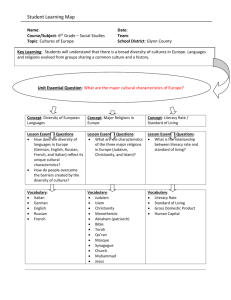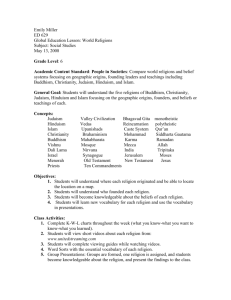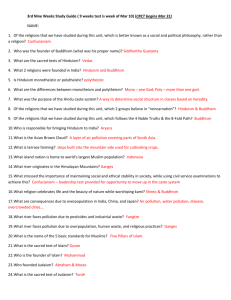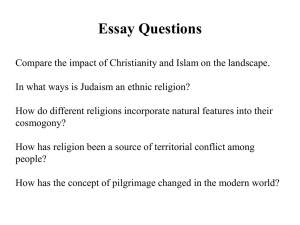World Religions:
advertisement
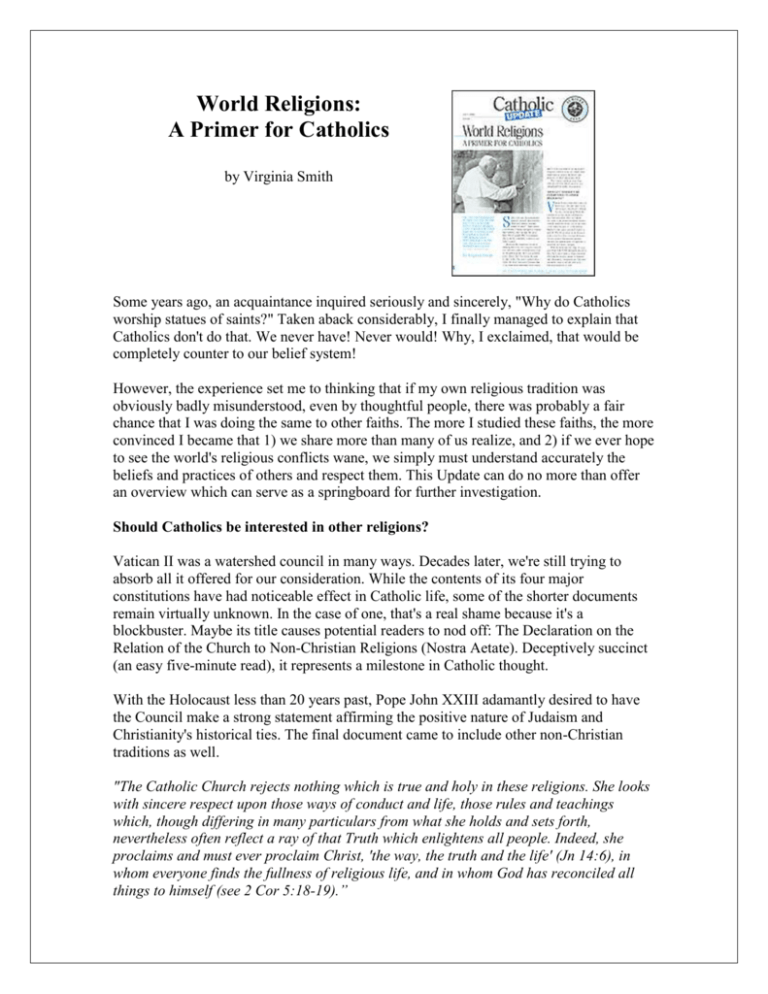
World Religions: A Primer for Catholics by Virginia Smith Some years ago, an acquaintance inquired seriously and sincerely, "Why do Catholics worship statues of saints?" Taken aback considerably, I finally managed to explain that Catholics don't do that. We never have! Never would! Why, I exclaimed, that would be completely counter to our belief system! However, the experience set me to thinking that if my own religious tradition was obviously badly misunderstood, even by thoughtful people, there was probably a fair chance that I was doing the same to other faiths. The more I studied these faiths, the more convinced I became that 1) we share more than many of us realize, and 2) if we ever hope to see the world's religious conflicts wane, we simply must understand accurately the beliefs and practices of others and respect them. This Update can do no more than offer an overview which can serve as a springboard for further investigation. Should Catholics be interested in other religions? Vatican II was a watershed council in many ways. Decades later, we're still trying to absorb all it offered for our consideration. While the contents of its four major constitutions have had noticeable effect in Catholic life, some of the shorter documents remain virtually unknown. In the case of one, that's a real shame because it's a blockbuster. Maybe its title causes potential readers to nod off: The Declaration on the Relation of the Church to Non-Christian Religions (Nostra Aetate). Deceptively succinct (an easy five-minute read), it represents a milestone in Catholic thought. With the Holocaust less than 20 years past, Pope John XXIII adamantly desired to have the Council make a strong statement affirming the positive nature of Judaism and Christianity's historical ties. The final document came to include other non-Christian traditions as well. "The Catholic Church rejects nothing which is true and holy in these religions. She looks with sincere respect upon those ways of conduct and life, those rules and teachings which, though differing in many particulars from what she holds and sets forth, nevertheless often reflect a ray of that Truth which enlightens all people. Indeed, she proclaims and must ever proclaim Christ, 'the way, the truth and the life' (Jn 14:6), in whom everyone finds the fullness of religious life, and in whom God has reconciled all things to himself (see 2 Cor 5:18-19).” "The Church therefore has this exhortation for her members: prudently and lovingly, through dialogue and collaboration with the followers of other religions, and in witness of Christian faith and life, acknowledge, preserve and promote the spiritual and moral goods found among these people, as well as the values in their society and culture" (by Virginia Smith, #2).” What gives a religion world status? What qualifies a religion for world status? The number of believers, past or present, cannot be the criterion. Judaism, which would make any list of great religions, has never been large and is today practiced by some 20,000,000. Japan's Shinto tradition currently has some 40,000,000 adherents. Christianity, on the other hand, is the faith of choice for over one third of the world's population, some 1,750,000,000 people. Islam, seen by many as today's fastest-growing religion, numbers some 950,000,000 believers. Is it the area of geographical dispersion that determines a "world" religion? Perhaps to some extent, but that surely would not be the dominant factor because while some religions are found in widely diverse sections of the globe (Islam, Christianity), others continue to be practiced primarily where they have always existed (Hinduism, Taoism, Confucianism). The definitive aspect is the influence a particular religion now wields, has exerted in the past, or both. Religion is one of the most pervasive factors in a culture and, as a result, has a lasting effect which sometimes outlasts the religion itself. China's ancient philosophies, Taoism and Confucianism, are no longer practiced to the extent they once were (the same is true of Shintoism in Japan). But even those who are largely unfamiliar with these faiths and do not practice them are the products of them, since these deeply embedded traditions have determined to a great extent the nature of the Chinese (Japanese) people. For that reason, if no other, they will probably always be listed as world religions. Western Beliefs Interestingly, the places of origin of the world religions fall neatly into two geographical areas, the Near (Middle) East and the Far East. There are remarkable similarities among these religions. Commonalities among the three Near Eastern (sometimes called Western) faiths— namely Judaism, Christianity and Islam-make sense when one remembers that both Christianity and Islam spring from Judaism and, therefore, share a similar worldview and concept of God. These religions trust in a single omnipotent, omniscient diety (monotheism) who, while entirely responsible for the creation of the universe, exists entirely apart from it and is in no way dependent on it. Human beings, made in the image (mirroring the traits) of this God, can, indeed must, enter into an interpersonal relationship. Morality is based on learning the will of God, understanding it and living it out both individually and as a community. Followers find themselves enmeshed in what is sometimes called conflicting dualism, a constant struggle between the forces of good and evil in which a person's free will plays the deciding role. God is revealed through creation, scriptural writings, other people, Jesus in Christianity and the ever broader, deeper insights contributed by each succeeding generation as human knowledge and understanding grow. Time is viewed as linear, something like a straight line from beginning to end. Therefore, as the Christian Scriptures' Letter to the Hebrews states, "...it is appointed that human beings die once, and after this the judgment" (Heb 9:27b). Each person is seen as a unique creation, sojourning through a single life span to attain the goal of eternal life with God. Resurrection of the body is compatible with this; reincarnation is not. Eastern Beliefs Members of Eastern religions are more likely to believe in many gods (polytheism) or a single central reality (monism). In the case of the Chinese religions, deities often take a backseat or no seat at all to philosophy. Their prime concern is how to live a happier, better life right here, right now. For some, creation contains the gods within itself. Shintoism is frequently thought to have originated as such an animist religion, seeing all elements of creation from plants to people as possessing within them an animating spirit. For others, such as Hinduism, the ultimate reality (Brahman), while absolute and supernatural, is completely unknowable and impersonal (referred to as "that" or "it"). Meditation which brings one onto the plane of the transcendental centers many of these faiths. The "doing" of the Western world gives way somewhat to simply "being." Conflicting dualism gives way as well either to monism or to a more harmonious dualism as exhibited in the interplay of forces known to the Chinese as yin and yang. While diametric opposites in many ways, yin and yang do not compete, but rather complement each other. Balance is the order of the day. While Far Eastern traditions possess holy books and writings considered scriptural, they are not generally as central to belief and practice as those found in the Western world. Even within the same religion, there may be wide divergence of opinion about sacred writings. The branch of Buddhism known as Theravada accepts only the Tripitaka (Three Baskets) of early Pali writings, whereas the Mahayanas' sutras represent many times the length of the Christian Bible. Comprehension of momentous matters may come in an instant or never. The emptying of the mind during meditation provides something like an open, empty vessel which is ready at all times should enlightenment occur. This phenomenon is especially prevalent in Buddhism. Buddha is actually a title, meaning "the enlightened one," much as Christ is a title, meaning "the anointed one." In the branch of Buddhism called Zen, this eagerly awaited flash of insight is known as satori. Time is viewed as cyclical rather than linear, the view of Western belief. Hindus call these cycles of creation, extinction, and re-creation, samsara. The same word refers to the process of rebirth which the Western world calls reincarnation. Samsara is more accurately seen as the transmigration of souls. What the new life will bring is largely contingent on what the old life held. Things can be made better—or worse—through the karma (action) of a lifetime. Climbing the karmic scale in Hindu tradition involves a societal stratification called the caste system. Liberation from the cycle of death and rebirth, moksha, comes about when one is absorbed into the ultimate reality, Brahman. A similar, but somewhat different, concept in Buddhism is Nirvana. To convert or not The status of proselytizing (actively seeking converts) ranges among world religions from near the top of the priority scale to near the bottom. Christianity, along with Islam, stresses making "disciples of all nations" (Mt 28:19a) to such an extent that it rarely occurs to Christians that adherents of many other faiths may not see this as a priority. That narrow focus has often hindered rather than helped the Christian missionary effort. Open attempts to convert have been viewed with resentment in areas such as India, where its dominant religion, Hinduism, makes no effort to change the beliefs of others, but rather finds ways to integrate them under the great umbrella of traditions which comprise the Hindu faith. This inclusive attitude has resulted in Hinduism's remaining largely on the Indian subcontinent where it originated, while Christianity and Islam, feeling obligated to spread their respective messages to the ends of the earth, are today global. Judaism, too, is non-proselytizing but for a very different reason. To be Jewish has typically involved not only a religious commitment but an ethnic heritage as well. Both the Bible's Hebrew and Christian Scriptures contain references to God-fearers: gentiles (non-Jews) who admired Judaism and practiced it to the extent that this was possible (Ps 118:4; Acts 8:26-40; 10:1-49). This became a pivotal issue in the infant Christian Church, most of whose members still considered themselves to be practicing a new and fulfilled form of Judaism. Did gentile converts need first to be Jewish? This issue led to the first general council of Christians, the Council of Jerusalem, in about the year 48 (Acts 15:135). Learning From Others When teaching World Religions to high school seniors, I routinely required them to address a series of questions regarding any faith we studied. Among these were: What can we as Catholic Christians learn from this religion to enrich our own? What can followers of this religion learn from Catholic Christians? What have you learned which would be of value in relating socially, professionally, academically or religiously to people of this faith? In these questions and others like them lie the seeds, I believe, of the understanding and respect so desperately needed, not only among the so-called world religions, but among all people of religious faith and those with none. The study of religious traditions other than our own may well be the greatest contribution we can make as individuals toward the cause of global peace. Some raise the concern that such a study runs the risk of weakening our commitment as disciples of Jesus. The opposite is usually true. Learning about other faiths almost of necessity requires us to delve more deeply into our own. Eight World Religions HINDUISM. For those rooted in Christianity, it's easy to assume that every religion must have been founded by someone, but that isn't necessarily true. The origins of Hinduism, by far the oldest of the religions within the "world" group, are lost in the mists of time but may extend as far back as 3000 B.C. For this reason Hinduism, most prominent in India, is sometimes called the Eternal Religion. And because it is able to accommodate such a wide range of beliefs and practices, it is also seen as the Umbrella Religion. "In Hinduism men contemplate the divine mystery and express it through an unspent fruitfulness of myths and through searching philosophical inquiry. They seek release from the anguish of our condition through ascetical practices or deep meditation or a loving, trusting flight towards God" (Nostra Aetate, #2). BUDDHISM, on the other hand, has a verifiable founder, a Hindu named Siddhartha Gautama (or Guatama) who was born and raised in the area today known as Nepal. Gautama's life spanned approximately the years 563-483 B.C. Following a sheltered upbringing which led to a rude encounter with the real world, Gautama set out in search of answers to his many questions and ultimately attained enlightenment while sitting beneath the Bo tree (Tree of Wisdom). Thereafter, he was seen as Buddha (the Enlightened One). "Buddhism in its multiple forms acknowledges the radical insufficiency of this shifting world. It teaches a path by which men, in a devout and confident spirit, can either reach a state of absolute freedom or attain supreme enlightenment by their own efforts or by higher assistance..." (Nostra Aetate, #2). CONFUCIANISM AND TAOISM. In China, K'ung Fu-tzu (Westernized as Confucius) was a minor administrator of the Chou dynasty, living from 551 to 479 B.C. His writings show him to have been focused on ways to improve life in the here and now far more than on deities and eternal realms. Both Confucius and his Taoist counterpart, Lao-tzu, are often said to have instituted philosophies rather than religions. Lao-tzu (meaning the Old Master) probably lived somewhere between 640 and 524 B.C. and is also said to have been a court official for the Chou emperors. His masterwork was the Tao Te Ching, still read extensively today. Once this work was completed, Lao-tzu faded from public view entirely. Some scholars doubt that such a person ever existed. SHINTOISM. Japan's Shintoism, like Hinduism, has no recognizable founder, emerging from the aboriginal religions of the islands in roughly 700. JUDAISM. In the Near East, Judaism began with Abraham, probably somewhere in the 19th century B.C. Although Abraham is seen as the father figure, certainly of Judaism and to some extent of Christians and Muslims as well, he cannot properly be termed a founder. The Genesis story (11:27—12:9) indicates that the initiative in establishing a relationship was taken by God, not by Abraham. He thus becomes the mutual patriarch of the three Western monotheistic religions, but not their founder. "For the Church of Christ acknowledges that, according to the mystery of God's saving design, the beginnings of her faith and her election are already found among the patriarchs, Moses and the prophets. She professes that all who believe in Christ, Abraham's sons according to faith (see Gal 3:7), are included in the same patriarch's call, and likewise that the salvation of the Church was mystically foreshadowed by the chosen people's exodus from the land of bondage" (Nostra Aetate, #4). CHRISTIANITY. Jesus' role in establishing Christianity need not be belabored here, although the fact that his early followers saw themselves as followers of the "Way," a new way to practice Judaism, rather than a distinct belief system, is worthy of note (Acts 9:2a). ISLAM is another religion with a founder around whose teachings the entire tradition is based. Muhammed was born in 570 in Mecca (today, Saudi Arabia) and lived until 632. There is no doubt that Muhammed's intent was to establish a new faith tradition, although he incorporated aspects of Judaism, particularly, and Christianity, which he admired. As a result, among Islam's most revered prophets are Abraham, Moses, Jesus and, of course, Muhammed. "Upon the Muslims, too, the Church looks with great esteem. They adore one god, living and enduring, merciful and all-powerful, Maker of heaven and earth and Speaker to all men. They strive to submit wholeheartedly even to His inscrutable decrees, just as did Abraham, with whom the Islamic faith is pleased to associate itself. Although they do not acknowledge Jesus as God, they revere Him as a prophet. They also honor Mary....They prize the moral life, and give worship to God especially through prayer, almsgiving and fasting" (Nostra Aetate, #4).
